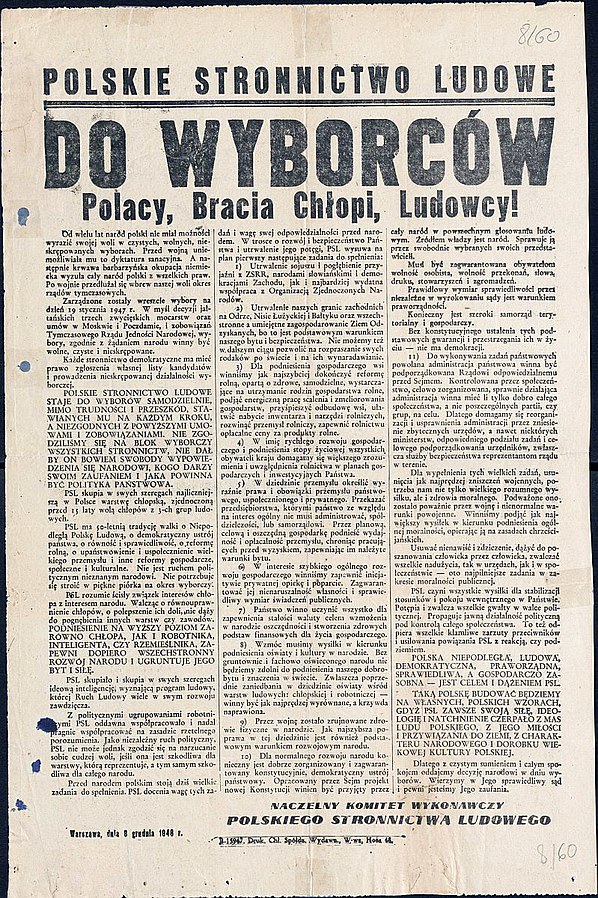Occupied by the Red Army and politically subordinated to the Soviets, the Polish Republic could not be reborn as an independent state within the pre-1939 borders. Between the Bug and the Oder rivers, a ‘People’s’ Poland was established. It fell into the hands of the communists executing Soviet orders and brutally suppressing all resistance and political opposition. One of the main methods of tackling political opponents was their assassination by ‘unknown perpetrators’.
Gradually gaining total power in Poland, in addition to taking over the names of pre-war parties, the communists introduced pro-communist activists into independent parties, who were supposed to split them from the inside and obstruct their activities. In the Polish People’s Party (PSL), this kind of role was played by Władysław Kiernik, a pre-war PSL leader who had opted for an alliance with the Polish Workers’ Party. Despite the efforts of the communists, the PSL became the largest political party after the end of the Second World War, which was due not so much to the enthusiastic support of Polish society for the peasants, but to the fact that the party of Mikołajczyk, prime minister of the Polish government in exile, was the only legal pro-independence political force which, it seemed, could threaten the communists’ monopoly.
Poland’s future was to be decided by parliamentary elections. Independence activists hoped that the Western powers would ensure that democratic procedures were followed during the elections, as promised. The communists deliberately delayed the elections to consolidate their power and liquidate popular resistance, which they did by expanding the apparatus of repression. Thousands of people were imprisoned and sentenced to death. Efforts were made to limit the PSL’s ability to act, and censorship was intensified. PSL activists, like other members of pro-independence organisations, were arrested, the functioning of party structures was obstructed, and there were intimidations, beatings, and murders of peasant politicians.
PSL politicians were murdered by PPR militiamen, Security Office, and Civic Militia (MO) officers, as well as members of the ORMO. For example, Andrzej Starzyński, who came from Borek in the Lublin Voivodeship, was murdered on 15 November 1946 by MO officers while distributing election leaflets. A photograph that found its way into the émigré press documented the murder of Józef Hachlica, who had given a speech a few days earlier at the funeral of two activists murdered by a PPR militia. During the pre-election campaign period, about 140 PSL activists were secretly murdered, about 10,000 were arrested, members of many district structures were banned, and lists of PSL candidates were invalidated in 10 electoral districts. Almost everywhere, PSL shop stewards were prevented from controlling the vote, which facilitated the communists to falsify the elections to the Legislative Assembly on 19 January 1947.





